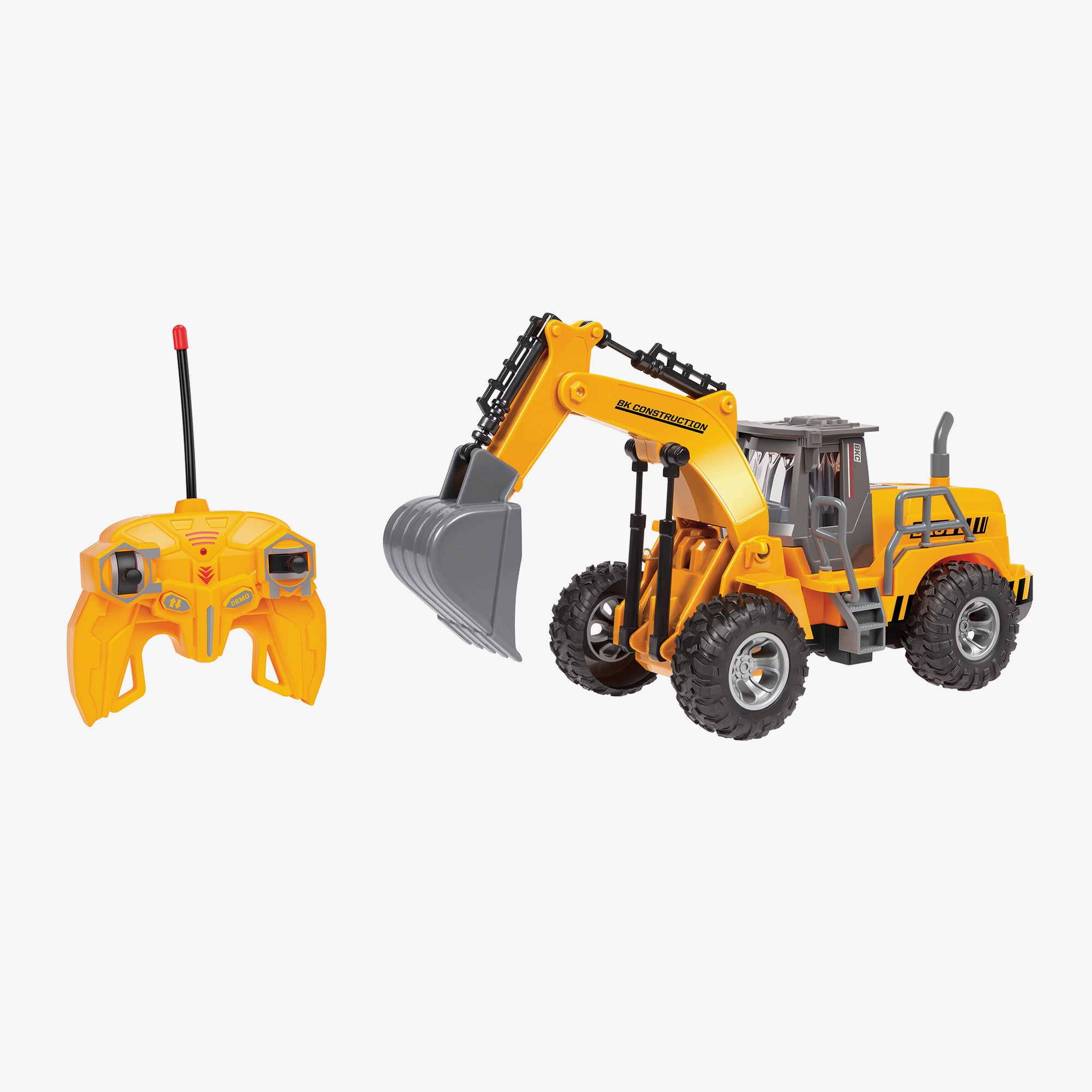Recognizing Exactly How Excavator Works and Its Influence On Effectiveness
Excavators play a vital role in building and construction and mining operations, relying upon a complex interaction of hydraulic and mechanical systems. Their capacity to execute a selection of jobs depends upon both their style and the technology incorporated within. Understanding these parts can considerably influence operational efficiency and performance. As innovations proceed to reshape the industry, one have to think about exactly how these changes will affect future methods and efficiency.
The Fundamentals of Excavator Mechanics

The Duty of Hydraulic Systems in Excavators
At the heart of excavator procedure exists the hydraulic system, which plays a pivotal role in powering the equipment's motions and functions. This system uses pressurized hydraulic liquid to move power, making it possible for numerous activities such as excavating, training, and moving. By utilizing the concepts of hydraulics, excavators can perform tasks with exceptional precision and force, improving overall operational efficiency.The hydraulic system contains essential components, including shutoffs, pumps, and cyndrical tubes, which work with each other to control the circulation and direction of the liquid. When the operator involves the controls, the hydraulic liquid is routed to particular cylinders, converting the driver's commands right into physical motion. This device enables responsive and smooth activities, which are vital in building and excavation settings. double e volvo rc excavator. The performance of the hydraulic system straight affects the efficiency and versatility of the excavator, making it a vital component in modern-day excavation procedures
Trick Parts of an Excavator
Understanding the essential elements of an excavator is necessary for understanding exactly how this powerful device runs. An excavator contains several substantial components, consisting of the undercarriage, home, pail, boom, and arm. The undercarriage supplies stability and wheelchair, usually including tracks or wheels to navigate different surfaces. Your house includes the engine and hydraulic systems, allowing the operator to control movement and power the maker. The boom expands from the home, enabling upright reach, while the arm attaches to the pail, facilitating digging and lifting operations.Additionally, the taxi houses the driver, outfitted with controls for precise maneuvering. Each of these components plays a vital duty in the excavator's overall functionality, adding to its efficiency and performance on building and construction websites. Recognizing these components aids in optimizing and preserving excavator performance, ensuring jobs are finished securely and effectively.
Add-on Adaptability and Its Benefits
Attachment convenience is a necessary aspect of excavators, allowing drivers to change in between different tools customized for specific tasks. This versatility not just boosts task performance however likewise adds to cost-effectiveness by lowering the need for several equipments. Understanding the different sorts of accessories offered can substantially affect the total efficiency and functionality of an excavator on job sites.
Kinds of Accessories
While excavators are mainly acknowledged for their excavating capabilities, their true adaptability exists in the wide variety of attachments available. These add-ons boost the excavator's performance, allowing it to execute numerous tasks past excavation. Common attachments consist of buckets (for excavating and scooping), hydraulic thumbs (for comprehending products), and augers (for drilling openings) Grapples are utilized for taking care of and moving particles, while rippers can separate hard surface areas. Various other specialized add-ons, such as plates and plows, allow excavators to adjust to specific task demands. This variety not only boosts the machine's utility across various sectors, including demolition, construction, and landscape design, however also enables operators to customize their equipment to satisfy details job demands effectively.
Boosted Work Effectiveness
Making best use of work effectiveness is a key benefit of using various excavator add-ons. Various attachments permit an excavator to perform multiple jobs without needing to switch tools, saving valuable time and labor. As an example, using a hydraulic hammer can break concrete while a pail accessory can dig deep into dirt, making it possible for a smooth operations. This convenience minimizes downtime related to equipment changes and improves productivity on-site. Furthermore, specialized add-ons enhance precision in jobs such as grading or landscape design, resulting in better results. The ability to adjust to different task requirements not just discover this info here simplifies operations however also decreases the demand for additional machinery, making sure that jobs are finished swiftly and properly. In general, accessory adaptability considerably adds to increased task effectiveness in excavation work.
Cost-Effectiveness and Flexibility
Cost-effectiveness is a considerable benefit of using versatile excavator attachments. These attachments permit a solitary excavator to perform several tasks, decreasing the need for extra machinery and labor - double e volvo rc excavator. By switching over between buckets, hammers, and grapples, operators can deal with different tasks, from excavating to demolition, consequently taking full advantage of devices utilization. This flexibility not just reduces operational costs but also reduces downtime related to changing equipment. Furthermore, the ability to personalize excavators with specialized add-ons improves performance, as they can successfully handle varied tasks according to task demands. In conclusion, the combination of cost-effectiveness and flexibility in excavator add-ons adds to boosted functional effectiveness and resource allotment in construction and excavation projects

Advanced Modern Technology in Modern Excavators
Modern excavators are significantly equipped with innovative technology that transforms excavation procedures. Automation improves operations, while enhanced fuel performance lowers functional expenses. Additionally, wise control systems improve precision and safety and security, marking a considerable evolution in excavation equipment.
Automation in Excavation Processes
As excavation innovation progresses, automation has actually become a vital part in enhancing effectiveness and precision on job sites. Modern excavators are outfitted with advanced automated systems that facilitate jobs such as grading, excavating, and trenching with minimal operator treatment. These systems utilize sensing units, GPS, and artificial intelligence algorithms to ensure precise positioning and deepness control, greatly decreasing the margin for error. Furthermore, automation allows drivers to concentrate on tactical decision-making as opposed to manual controls, bring about improved performance generally. Such developments not just improve workflows however also improve safety and security by reducing human error in complex operations. The assimilation of automation in excavation procedures represents a substantial development in building and construction innovation, driving the sector in the direction of better efficiency and effectiveness.
Enhanced Fuel Effectiveness
Developments in innovation have actually additionally led to significant improvements in gas performance for contemporary excavators. Modern machines are equipped with sophisticated engines that maximize power outcome while lowering fuel usage. These engines make use of ingenious burning innovations, such as turbocharging and direct gas injection, to improve efficiency and effectiveness. Furthermore, lightweight products in building and construction lower total weight, allowing for less power expense during operation. The introduction of variable speed controls makes it possible for operators to adjust engine efficiency according to details jobs, additionally reducing gas use. As a result, these enhancements not only reduced operational prices however likewise contribute to ecological sustainability by minimizing discharges. On the whole, improved fuel performance in excavators is a crucial development that bolsters productivity and economic viability in the building industry.
Smart Control Equipment
While drivers navigate increasingly intricate work websites, wise control systems in excavators have actually emerged as necessary devices for improving efficiency and precision. These advanced modern technologies use formulas and sensing units to keep track of numerous parameters such as tons weight, surface problems, and functional performance. By immediately adjusting hydraulic features, wise systems optimize device performance, resulting in improved efficiency and minimized endure components. Additionally, operators benefit from instinctive user interfaces that offer real-time comments and diagnostics, enabling for informed decision-making. This integration of modern technology not just streamlines operations but additionally reduces human error, contributing to much safer workplace. As the building market proceeds to advance, clever control systems will certainly play a crucial function in forming the future of excavator effectiveness and effectiveness.
Enhancing Functional Performance With Excavators
Excavators play a crucial role in boosting functional effectiveness across different construction and excavation jobs. Their adaptability permits for several tasks, including excavating, lifting, and product handling, which streamlines workflows and lowers the need for additional equipment. With effective hydraulic systems, excavators can carry out durable jobs with accuracy, significantly decreasing the time called for to full tasks. The combination of sophisticated innovation, such as general practitioner and automated controls, even more enhances their operation, allowing drivers to achieve better accuracy and decrease material waste. In addition, contemporary excavators are made to consume much less gas and reduce discharges, adding to both cost financial savings and ecological sustainability. By using excavators effectively, building teams can enhance efficiency, satisfy project due dates, and boost overall site monitoring. This multifunctionality and efficiency make excavators important devices in the modern building landscape.
The Future of Excavators in Construction and Mining Industries
As the building and mining markets develop, the future of excavators is poised for substantial makeover driven by technical advancement a knockout post and altering operational needs. Advancements in automation and artificial intelligence are improving excavator capacities, permitting improved accuracy and performance in procedures. Independent excavators are emerging, lowering the demand for human intervention and decreasing the risk of accidents.Moreover, the assimilation of telematics and IoT innovation enables real-time surveillance of machine efficiency and anticipating maintenance, enhancing uptime. Green layouts, including electrical and hybrid versions, are gaining traction, lining up with sustainability goals within the industry.Additionally, making use of advanced products and lighter designs improves fuel effectiveness while maintaining efficiency criteria. As these patterns development, excavators will play a vital role in fulfilling the raising needs for performance and safety and security in building and mining, ultimately transforming operational landscapes.
Frequently Asked Concerns
Exactly How Do Weather Condition Conditions Impact Excavator Efficiency?

Climate condition substantially affect excavator efficiency, as rain and mud can hinder traction and security, while extreme temperatures may influence hydraulic systems. Operators must adapt to these variables to assure suitable functionality and safety and security throughout operations.
What Precaution Should Operators Follow While Using Excavators?
Precaution for excavator operators include my explanation using proper individual safety tools, performing pre-operation examinations, guaranteeing correct communication with ground personnel, keeping a secure range from above dangers, and adhering to well-known functional procedures to stop mishaps.
Just How Often Should Excavators Be Preserved for Optimal Performance?
Excavators need to be kept routinely to ensure peak performance, generally every 250 operating hours or as defined by the supplier. Regular checks boost integrity, protect against unanticipated break downs, and prolong the life expectancy of the equipment.
What Is the Typical Life Expectancy of an Excavator?
The ordinary life-span of an excavator generally varies from 10,000 to 15,000 hours of operation. Variables influencing durability consist of upkeep practices, operating problems, and the high quality of the equipment itself, impacting general performance and efficiency.

Can Excavators Operate on Uneven Terrain Successfully?
Excavators can run efficiently on irregular surface due to their verbalized layouts and adjustable tracks. These attributes permit them to maintain stability and grip, allowing effective operation in tough settings frequently run into in building and construction and landscaping tasks. Each of these parts plays an important duty in the excavator's total functionality, contributing to its effectiveness and effectiveness on building sites. Maximizing job performance is a key advantage of using various excavator accessories. While operators navigate significantly complex task sites, clever control systems in excavators have actually emerged as important tools for boosting effectiveness and precision. Excavators play a necessary function in boosting functional efficiency across various building and construction and excavation projects. Breakthroughs in automation and man-made knowledge are improving excavator capabilities, allowing for enhanced accuracy and performance in procedures.